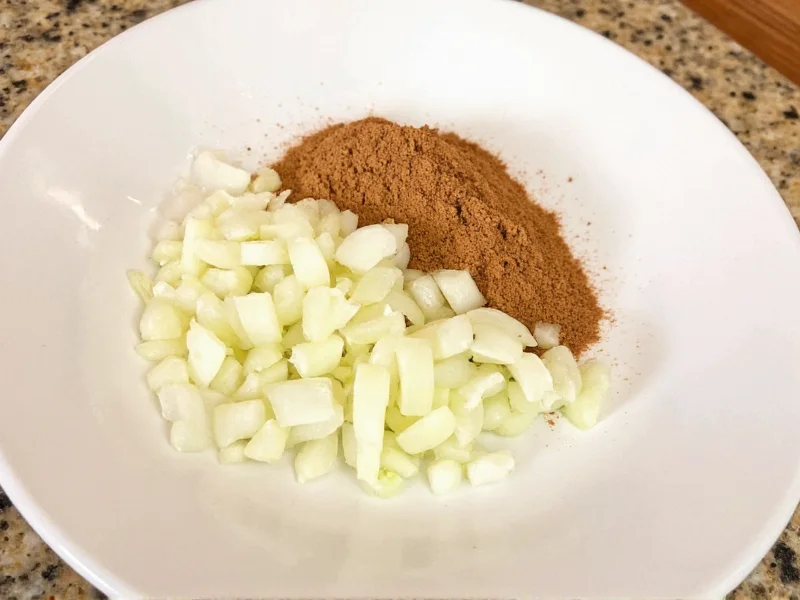Understanding how to properly convert between fresh diced onions and onion powder is essential for consistent cooking results. Many home chefs face this common kitchen dilemma when following recipes or adapting them based on available ingredients.
Understanding Onion Forms and Their Properties
Fresh diced onions contain approximately 89% water, which significantly affects their volume compared to dehydrated onion powder. When onions are dried and ground into powder, the water content is removed, concentrating the flavor while reducing the physical volume.
Onion powder provides convenience and longer shelf life but lacks the textural element that fresh diced onions contribute to dishes. The conversion process isn't merely mathematical—it also involves understanding how these different forms behave in various cooking applications.
Standard Conversion Ratios for Cooking Accuracy
Professional chefs and food scientists have established reliable conversion guidelines that account for both volume and flavor concentration:
| Fresh Diced Onions | Equivalent Onion Powder | Best For |
|---|---|---|
| 1 small onion (about 1/2 cup diced) | 1 tablespoon | General cooking, soups, stews |
| 1/4 cup diced onions | 1 tablespoon | Most recipe conversions |
| 1 cup diced onions | 1/4 cup | Bulk recipe adjustments |
| 1 medium onion | 1.5 tablespoons | Precise baking applications |
Practical Substitution Guidelines for Home Cooks
When substituting onion powder for fresh diced onions, consider these practical factors that affect your diced onion to onion powder conversion success:
- Moisture content matters: Sweeter onion varieties like Vidalia contain more water, requiring slight adjustment to the standard ratio
- Flavor intensity varies: Dehydrated onion powder often has a more concentrated flavor than fresh onions
- Texture considerations: Onion powder won't provide the same textural element in dishes like salsas or salads
- Rehydration potential: For some applications, reconstituting powder with water can mimic fresh onion texture
How to Make Your Own Onion Powder from Fresh Onions
If you're looking for the best homemade onion powder alternative to store-bought, follow these professional steps:
- Peel and finely dice fresh onions (¼" pieces work best)
- Salt lightly and let sit for 10 minutes to draw out moisture
- Spread in single layer on dehydrator trays or baking sheet
- Dehydrate at 135°F (57°C) for 6-8 hours until completely brittle
- Grind to fine powder using spice grinder or blender
- Sift through fine mesh strainer to ensure uniform consistency
- Store in airtight container away from light and moisture
This homemade onion powder conversion method produces a product with superior flavor to commercial varieties, as you control the dehydration process and avoid anti-caking agents.
Recipe-Specific Conversion Adjustments
Not all recipes respond equally to onion powder substitution for diced onions. Consider these category-specific guidelines:
- Slow-cooked dishes (stews, braises): Use standard 4:1 ratio as moisture evaporates during cooking
- Baked goods (breads, biscuits): Reduce powder by 25% to prevent over-seasoning
- Raw applications (salsas, salads): Avoid substitution as texture is critical
- Sauces and gravies: Mix powder with liquid first to prevent clumping
- Meat rubs: Onion powder works better than fresh for even flavor distribution
Storage and Shelf Life Considerations
Proper storage affects the accuracy of your diced onion to onion powder measurements over time:
- Fresh diced onions last 7-10 days refrigerated in airtight container
- Homemade onion powder maintains peak flavor for 6-8 months
- Store-bought onion powder typically remains potent for 12-18 months
- Always check for color change or musty smell indicating degradation
- Freezing extends fresh onion shelf life to 6-8 months (though texture changes)
Older onion powder may require slightly increased measurements as flavor compounds degrade over time—a crucial consideration for precise onion powder conversion in professional cooking.
Taste Testing for Perfect Results
The most reliable method for ensuring accurate diced onion to onion powder substitution is taste testing. Since onion potency varies by season and variety, always:
- Add powder gradually, tasting as you go
- Allow dishes to rest for flavors to meld (especially important with powder)
- Remember that heat intensifies onion flavor during cooking
- Adjust acidity (lemon juice or vinegar) to balance stronger onion powder flavor
Professional chefs recommend making a small test batch when converting recipes that heavily feature onions, as the onion powder equivalent to fresh diced onions can vary by up to 20% depending on specific conditions.











 浙公网安备
33010002000092号
浙公网安备
33010002000092号 浙B2-20120091-4
浙B2-20120091-4